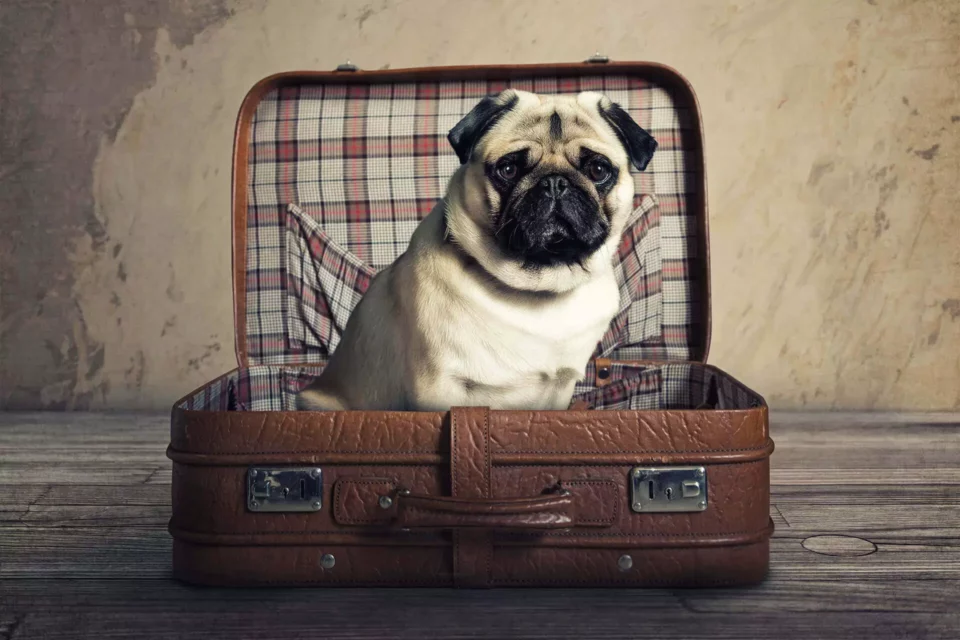For animal lovers, one of the most stressful aspects of relocating to another country is figuring out what to do with their pets. After all, our furry (or scaly) friends are part of the family too! Still, if you’re moving with pets overseas, you need to learn how to do it successfully but without putting your furry friend through too much stress. That’s where our guide comes in – so make sure you memorize it.

Researching the Pet Import Laws of Your Future Country Is a Must
Although it may be tempting to just hope for the best and don’t take any precautionary steps, that’s not really an option when it comes to something as important as your pet’s well-being. Therefore, one of the first steps on your to-do list should be researching the import laws of your future country, that is a must.
Pet import laws are designed to protect both animals and humans from diseases and other health hazards that can be transmitted through contact with animals. Every country has different regulations when it comes to importing pets, so it’s important to familiarize yourself with the laws of your future home before you make any plans. Depending on where you plan to live abroad, you may need to get your pet vaccinated, provide proof of health from a veterinarian, or obtain an import permit.
Additionally, some countries may have restrictions on certain breeds or types of animals. For example, the aggressive reputation of American Pit Bull Terriers is the reason this dog breed is banned from most countries.
Why Is Knowing These Restrictions Important?
If you’re not aware of the regulations and try to import your pet without following them, you could face hefty fines or even have your pet confiscated at customs. Secondly, if you’re not up-to-date on the required vaccinations or health documents, the animal could be put in quarantine upon arrival in your new country – and no one wants that! By doing your research in advance, you can be sure that you’re giving your pet the best possible chance of making a smooth transition to their new home.

Can You Move Pets Other Than Cats and Dogs?
Dogs and cats are the most common pets that people have, so it’s no surprise that they’re also the most commonly accepted animals when crossing international borders. If you’re relocating with dogs or cats, there are usually just some paperwork requirements that you’ll need to take care of in advance, such as getting an international health certificate and making sure your pet’s vaccinations are up-to-date.
Birds are another type of animal that is relatively easy to move with as long as you have all the right documentation. In addition to an international health certificate, you’ll need an import permit from the country you’re moving to. If you’re relocating to Melbourne, for example, keep in mind that not all bird species are allowed to be imported into Australia. Still, as long as you have all of your ducks in a row (pun intended), there’s no reason why you shouldn’t move with your feathered friend. The same goes for guinea pigs, hamsters, and rabbits – but note that relocating a fish can get a bit more complicated.
Packing Services
International relocation can be divided into several main stages and packing is one of them.
Read MoreOverseas Vehicle Shipping
When it comes to relocating your car, there is a way to do it that won’t cause a headache.
Read MoreStorage Service
Organizing an international move can be a nightmare if you don’t have a professional relocation company to help you with the overseas shipping of your entire household inventory.
Read MoreAs for exotic animals, they are defined as any animal that is not native to the country you’re relocating to. This includes animals like iguanas, turtles, snakes, and even some breeds of dogs and cats. While it is possible to move with an exotic animal, it generally requires more paperwork and preparation than relocating with a more common pet. If you plan to live in another country, note that sometimes you might even need special permission from the government to import your exotic pet.
Does Moving Overseas Pose Any Risks for Your Pets?
If you have an older pet, you should always take into account how much stress they can handle. If they are not adequately crate trained and prepared beforehand, high-anxiety pets also run the risk of hyperventilating and hurting themselves. Additionally, keep in mind that some snub-nosed dogs, like English bulldogs or pugs, are at higher risk when traveling because of their specific respiratory system. Therefore, after speaking with a dog relocation consultant and veterinarian, it is ultimately up to the owner to decide whether to fly with their pet.

A Medical Examination Is Mandatory Before Moving With Pets Overseas
The additional medical examination may seem like a hassle when relocating to a new country from the US, but it’s actually in your pet’s best interest. A medical examination will ensure that your pet is up-to-date on all their vaccinations and that they’re healthy enough to make the trip. It’s also a good opportunity to get any questions you have answered by a professional.
When you take your pet in for their medical examination, there are a few things you’ll need to bring with you. These include:
- Your pet’s vaccination records – since all pets must be up-to-date on their vaccinations before relocating overseas, your vet needs to check the pet’s previous vaccinations. If your pet is not up-to-date on their vaccinations, they will likely need to get them before traveling.
- A list of any medications your pet is currently taking – this includes both prescription and over-the-counter medications. The veterinarian will need to know what medications your pet is taking to ensure that they won’t have any adverse reactions to them while traveling.
- Any questions you have about traveling with pets – it’s an opportunity to get professional advice about the best way to care for them during the move. Be sure to ask any questions you have so that you can make the transition as stress-free as possible for both you and your furry friend!
Gather All of the Necessary Documentation
The first thing you need to do is check with the embassy or consulate of your destination country to find out which documents you need to travel abroad, both for you and your pet. Each country has different rules and regulations, so it’s important to get this information ahead of time. Once you know what’s required, you can start gathering the needed paperwork. This may include things like proof of vaccinations, passports, health certificates, and microchip information.
If you plan on getting packing services in order to start living overseas, note that most countries will require that you obtain a health certificate from a licensed veterinarian in order for your pet to be allowed entry. The certificate should state that your pet is free from any contagious diseases and has been vaccinated according to the requirements of your destination country.

Prepare Your Pet for the Move in the Best Way Possible
Since it’s more likely that you won’t be able to bring them into the cabin, you should research the best airline companies that will allow your pet to travel in a pressurized and climate-controlled cargo hold. This means that even when traveling without their owner, your pet is comfortable.
Additionally, careful preparation must not be one of the things you forget to do before the move. You should get them accustomed to their crate so they don’t feel scared during the move. Start by placing it in a common area of the house and leaving the door open so they can come and go as they please. Then, over several weeks, slowly begin closing the door for short periods of time until they’re comfortable being inside it with the door closed. On relocation day, put their favorite toy or blanket inside the crate to help them feel more at home.
Of course, the pet’s carrier must pass the airplane approval – take a look at the video below for some good relocation hacks on assembling the carrier for airplane travel.
Consider Your Pet’s Relocation Essentials
As with any other family member, your little friend has things used on a daily basis that will be needed during the move and from the first day in a new home. When moving abroad with your furry friends, here are necessities that should find a place on your relocating abroad checklist:
- Food and water bowls,
- Leashes and collars,
- Toys,
- Bedding,
- Any necessary medication,
- Veterinary records,
- Travel crate or carrier for safe transportation,
- Litter box and litter (for cats),
- Brush or comb for grooming purposes,
- Favorite treats or comfort items,
- A familiar item with your scent on it to help ease their stress during the move
Before movers from an overseas shipping company come, make sure these items are set aside, so they don’t take them with the rest of the boxes – it will help you avoid one of the most common relocation mistakes.
What to Do After You Move to a New Country?
Relocating to another country is a big adjustment for everyone in the family – including the furry members! Pets can be especially sensitive to change, so it’s important to do what you can to help them feel comfortable and settled in their new home. Here are some tips you can incorporate into your relocation day preparations and get your pets off on the right paw in their new country:
Establish a routine as soon as possible
Pets are creatures of habit, and they find comfort in routines. After you’ve moved and unpacked, take some time to establish feeding times, walks, and playtimes that are similar to what your pet was used to in your previous home. This will help your pet feel like things are still “normal” even though everything around them has changed.
Make sure they have a safe space
It’s important that they have a space in your new home that is just for them. This could be a corner of the room, a dog crate, or even just a comfy bed – whatever makes your pet feel most comfortable. Having this space will help your pet feel like they have control over at least one part of their environment and make the transition smoother overall.
Be patient with them
It can take animals weeks or even months to fully adjust to relocating across the world. Just like human beings, they need time to get used to new sights, smells, and sounds. It’s important not to push them too hard or force them into situations they’re not ready for – let them come out of their shell on their own time, and things will eventually fall into place.
Hire an International Moving Company and Focus On Taking Care of Your Pets
Moving internationally with your furry friends is a complicated process that requires special care and attention. That is why it’s always a good idea to hire a reliable overseas moving company to take some of the relocation burdens off your back and help you move efficiently. This way, you can focus on taking care of your furry friends and making sure they have a smooth transition to their new home. Leave all the hard work of shipping overseas to the professionals. Therefore, if you want to get rid of relocation stress, investing in professional international moving services is the safest bet.


















